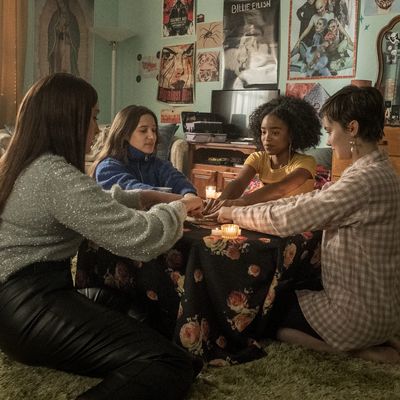
The witches in The Craft: Legacy don’t fight among themselves. Frankie (Gideon Adlon), Lourdes (Zoey Luna), Tabby (Lovie Simone), and newcomer Lily (Cailee Spaeny) don’t vie for position or develop resentments over having crushes on the same guy. They use their blossoming powers on behalf of the community, which means things like effacing slut-shaming graffiti from a locker and humiliating a homophobe by turning his jacket rainbow-colored. As their pièce de résistance, they use a spell to transform a sexually menacing bully named Timmy (Nicholas Galitzine) into an emotionally open young man who holds forth about heteronormativity and how much he loves Princess Nokia — not just for her music, but for her politics. The only disagreement the coven experiences arises when one of its members does something the others feel was a violation of consent. They’re progressive, positive young women, and they’re tragically boring, which is less the fault of their woke makeover than the film’s conviction that it’s incompatible with conflict or distinct personalities.
After watching The Craft: Legacy, I wandered into an interview that writer-director Zoe Lister-Jones did with Vanity Fair in which she explained her interest in doing something different from the original, a ’90s artifact that she saw as being “about women whose power was too overwhelming for them to harness and was turned on each other.” This is an illuminating if curiously passive-voiced interpretation of The Craft, a baby-goth fantasia about four outcasts who find they’re able to do magic together and immediately use it to do things like make a racist’s hair fall out, heal burn scars, and murder an abusive stepfather. The quartet in The Craft: Legacy are a much milder, if nominally more intersectional, bunch — Lourdes is a trans Latina character who gently counters Frankie when the latter gushes about pregnancy as a woman’s superpower. But the characters are also so much less developed as individuals overall, their unique desires and personal histories shunted aside in favor of group solidarity. If the original The Craft was about the strength and the limits of marginalization as common ground, The Craft: Legacy ultimately just settles on being a hurried protest against the patriarchy.
That said, it’s not without charms. The biggest disappointments of The Craft: Legacy stem from it starting off so promisingly, using elements of its source material while heading somewhere unpredictable. It opens with Lily and her mother Helen (Michelle Monaghan) moving in with Adam (David Duchovny), the man with whom Helen has been having a whirlwind long-distance romance. His vine-covered home is a fortress of quiet machismo, not just because he shares it with his three sons — Isaiah (Donald MacLean Jr.), Jacob (Charles Vandervaart), and Abe (Julian Grey), who barely acknowledge their new sorta-stepsister — but because he’s a minor pop-psych star who runs workshops about manhood and writes books entitled The Hallowed Masculine. Helen is consumed with her new relationship, and Lily’s supportive but adrift — and then, on her first day at her new school, she experiences a menstruation mishap that Lister-Jones films with all the dread of a panic dream. It’s as Lily’s hiding, mortified, in the bathroom that she’s approached by the three budding witches, who want to help, and who also have a feeling she’s the fourth member they’ve been waiting for. Before you know it, the completed coven members are talking telepathically and learning to stop time and seeing one another’s auras in hazes of greens and purples.
This sequence gets nowhere near the headiness of the equivalent moments in the original, when spells start working for the first time, fulfilling dark fantasies of power, beauty, and revenge. But it’s enjoyable anyway, helped along by the way the actors shriek with the unalloyed delight of teenagers who’ve just been gifted floor seats to see Harry Styles. They’re playing a group of joyful girls discovering the world is open to them, and The Craft: Legacy takes such pleasure in their company that it can’t help but be a little infectious, even as the movie starts to feel stuck, tension falling away and the action slowing to a crawl. The film is so reluctant to subject its characters to any stress that it consigns most of its major dramatic developments into its barely coherent last half hour, which is when a foe finally emerges — and I refuse to label this revelation a spoiler, he’s literally the only possibility. The Craft: Legacy seems to begrudge not just the time it has to spend on its villain but the need for a villain entirely, which is a shame because a knitwear-clad warlock Jordan Peterson is way too rich a concept for an antagonist to get shortchanged so shamelessly. Lister-Jones’s film feels like it would have happily stayed in its cozy middle section forever, with its characters playing not rebellious misfits but social-justice avengers who are effortlessly on the side of right. By the time one of them cites the original film’s most famous line — “We are the weirdos, mister” — what’s clear is that the characters may be many things, but that is definitely not one of them.
More Movie Reviews
- Guy Ritchie Goes Brutally Posh
- Dune: Part Two Is Zendaya’s Movie
- Drive-Away Dolls Is Just Fizzy Enough





